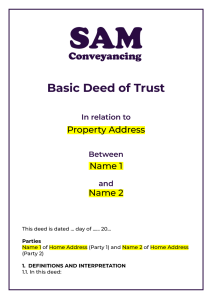Does a Declaration of Trust Affect the Mortgage?
A Declaration of Trust is part of a Deed of Trust, and it declares who the beneficial owners are and what their equity is in a property in England & Wales. It is used between homeowners for protection or between landlords for tax purposes.
In most circumstances, a mortgage lender will allow a Declaration of Trust to be used for this purpose; however, there are some circumstances where they will object. The reason for objecting would usually be if the declaration would affect their ability to repossess the property in the future and sell it. For example, if the mortgage terms don't bind a beneficial owner.
You can find out if your mortgage lender would object to a declaration of trust by reviewing your mortgage terms and conditions.
How Could a Declaration of Trust Impact a Mortgage Lender?
The buyer's solicitor will review the document to determine whether it could impact the lender. If the Declaration of Trust could impact the lender, the buyer's solicitor will have to get consent from the lender.
For a lender, their biggest concern is that the loan will be repaid; therefore, any terms in the Declaration of Trust that could impact the lender's ability to repossess the home may make it harder to obtain their consent.
One way a Declaration of Trust can be used is to grant a third-party adult the right to live in the property without their name being on the legal title or mortgage. This would impact the lender’s security because that third-party adult could potentially block them from repossessing the property. In this instance, the Declaration of Trust does impact the mortgage.
Deeds of Trust suitable for mortgage lenders
We provide specialist Deeds of Trust for joint owners, specifically drafted to avoid prejudicing the mortgage lender's security. Our services cover a range of requirements, including:
Fixed Share Deed of Trust
For joint owners purchasing a home who need to declare specific, fixed beneficial interests (e.g., Jane 40%, Mike 60%) and confirm intentions regarding a future sale or relationship breakdown.
Deed of Trust for Tax Purposes (Form 17)
Essential for married couples who own Buy-to-Let property and wish to share property income in unequal shares for tax optimisation. This deed must be filed alongside HMRC Form 17.
Floating Deed of Trust
A bespoke solution providing a variable beneficial interest that fluctuates over time to reflect contributions like mortgage repayments, purchase costs, and property developments.
Deed of No Beneficial Interest
Typically used in joint mortgage, sole proprietor arrangements where one party must declare a zero beneficial interest (critical for Stamp Duty Land Tax avoidance, divorce, or securing jointly-shared but not jointly-owned property).
What happens if you notify the lender of a Declaration of Trust?
Once you formally notify the mortgage lender that a Declaration of Trust (or a Deed of Trust) exists, you are legally bound by their response. If your deed is non-prejudicial to their security, there should be no issue, and they will agree to the terms.
If, however, the mortgage lender does not agree with your deed, your solicitor must immediately liaise with them. They will seek clarification on the specific terms the lender objects to and then look to redraft the deed to meet their regulatory guidance.
If you encounter an unexpected issue with your mortgage lender, we may be able to help you with redrafting your deed using our specialist solicitor.
Does the mortgage lender need to see the document?
In most instances, a Declaration of Trust is solely used to define the equity split between joint homeowners and does not impact the mortgage lender's security. This means the lenders will not need to see the document. A qualified solicitor will be able to review the document, ensuring that it does not require the lender's formal consent.
What is in a Declaration of Trust?
The part of a deed of trust that is the Declaration of Trust contains
- The names of the beneficial owners; &
- The percentage each beneficial owner holds of the property is from 1% to 100%.
The other parts of the deed can then provide further clarity on matters such as how the outgoings will be split or under what circumstances the property can be sold.
Can a Declaration of Trust be reversed?
A Declaration of Trust can be reversed (Deed of Surrender) or altered (Deed of Variation) at any time. However, all parties who signed the original document must agree to any alterations or revisions. A Declaration of Trust is not as secure from a legal standpoint as a Deed of Trust. A Deed of Trust encompasses more legal information, such as sale clauses, for example.
There are a couple of options to consider when trying to reverse a Declaration of Trust:
- A Deed of Surrender is used to completely remove the Deed of Trust. This is a declaration to remove the current deed, formally ending it.
- Joint owners can revoke the previous deed by drafting a new one. Bear in mind that this is only revocable if all parties who signed the previous deed also sign the new one. While a Deed of Variation can be used in this instance to make changes to the deed, it's recommended to draft a new Deed of Trust. You can only have one deed per legal title, so the deed with the most current date will revoke the previous deed.
- If one or more parties are coming off the title, a Deed of Surrender will first be used. Once the previous deed has been revoked, the remaining parties will draft a new Deed of Trust.
It is possible for a family court to reverse the Declaration or Deed of Trust. This can be done if the court believes the Declaration of Trust is a party to the divorce or dissolution proceedings. The court will divide the assets fairly among the parties, ensuring fairness and prioritising the well-being of any children involved. A Declaration of Trust is more likely to be taken into account during divorce proceedings if the couple also has a pre-nuptial and or post-nuptial agreement.
Protect your interest in a property and confirm how to sell. Drafted by a solicitor.
The first draft is within 1 to 2 working days* and includes:
- Deposit paid.
- The percentage ownership of each party.
- How to share expenses like the mortgage and bills.
- Share of property income - rent or gain on sale.
- How to sell the property.
- How the property is divided in the event of separation, divorce, or death.
Andrew started his career in 2000 working within conveyancing solicitor firms and grew hands-on knowledge of a wide variety of conveyancing challenges and solutions. After helping in excess of 50,000 clients in his career, he uses all this experience within his article writing for SAM, mainstream media and his self published book How to Buy a House Without Killing Anyone.
Caragh is an excellent writer and copy editor of books, news articles and editorials. She has written extensively for SAM for a variety of conveyancing, survey, property law and mortgage-related articles.










